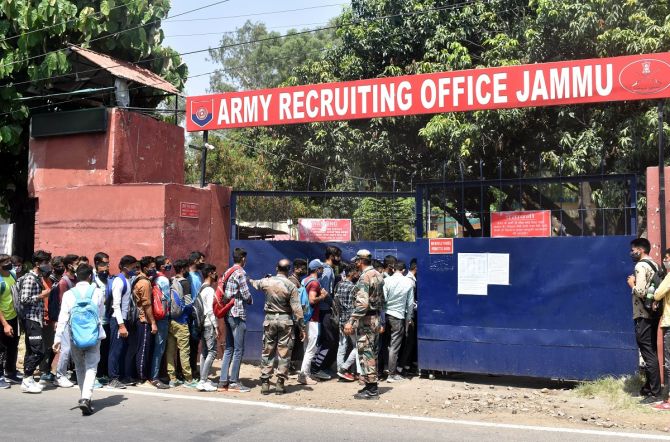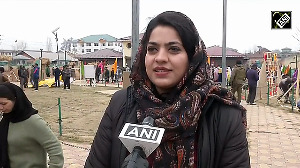Policy decisions, particularly those which have wide-ranging implications on the nation's health and security, should be decided by bodies best suited to do so, the Delhi high court said on Monday while refusing to interfere with the Agnipath scheme.

It said the courts cannot and should not delve into the appropriateness of such policy decisions and, thus, endanger one of the most important aspects of the basic structure doctrine, that is, the principle of separation of powers.
The court also observed that there have been several border skirmishes in the recent past which exacerbate the need to have a leaner and fitter armed force that is capable of handling mental and physical distress.
It said rather than focusing on the alleged ”political motives” of the scheme, it is necessary to focus on the benefits provided by it.
”We have extensively gone through the Agnipath scheme, and can conclusively state that this scheme was made in national interest, to ensure that the armed forces are better equipped,” a bench headed by Chief Justice Satish Chandra Sharma said in its 55-page verdict.
The bench said the formulation of the scheme is an exercise of the ”sovereign policy-making functions” of the central government, which ought not to be interfered with unless on the settled principles.
The scope for judicial interference is further constrained when the scheme or policy decision pertains to the national security of the nation, it said, adding that the present issue, that is, the recruitment of soldiers in the armed forces, most definitely qualifies as one falling under the ambit of ”national security”.
”It is exceedingly clear that this court does not interfere with policy decisions pertaining to national security in the normal course, as this court is not best placed to take such decisions,” the bench said.
The Agnipath scheme, unveiled on June 14, 2022, lays out rules for the recruitment of youth in the armed forces. According to these rules, those between 17-and-a-half and 21 years of age are eligible to apply and they would be inducted for a four-year tenure. The scheme allows 25 per cent of them to be granted regular service subsequently. After the scheme was unveiled, protests erupted in several states against the scheme.
But in a victory for the government, the Delhi high court on Monday gave a go-ahead to the Agnipath scheme saying it was formulated with a laudable objective of maintaining national security and to ensure that the armed forces are better equipped.
The high court said it is a ”well thought out policy decision by the Government of India” and dismissed a batch of petitions assailing the scheme.
The bench said, ”As our collective memory serves us, there have been several border skirmishes in the recent past. Such transgressions exacerbate the need to have a leaner and fitter armed force which is capable of handling the mental and physical distress that accompanies service in the armed forces.”
The high court said it does not find the scheme to be ”arbitrary, capricious or devoid of reason” and the policy decisions with regard to national security are taken after careful consideration of the socio-political scenario of the country, along with the socio-political scenario of the border countries.
The bench of Chief Justice Satish Chandra Sharma and Justice Subramonium Prasad said this court finds it apposite to reiterate that policy decisions, particularly those which have wide-ranging implications on the nation's health and security, should be decided by bodies best suited to do so.
”It appears that the government has been considering, for a long time, the possibility of creating armed forces which consist of more youthful, agile, and physically adept individuals.
”Upon considering the opinions of experts bodies, defence personnel and carefully studying the models adopted by other nations, it has decided to finally replace the prior mode of recruitment with the recruitment envisaged by the Agnipath Scheme.
"Considering that the stated objective of the government is neither discriminatory nor mala fide or arbitrary, this court finds no reason to interfere with it,” the bench said, dismissing 23 petitions.
Besides pleas challenging the Agnipath scheme, the court also dismissed the bunch of petitions relating to the recruitment process for the armed forces under certain previous advertisements, clarifying that such candidates do not have a right to seek recruitment.
The government had later extended the upper age limit to 23 years for recruitment in 2022.
The bench said it settled that the scope of judicial review accorded to this court does not extend to excessively questioning the policy decisions of the government, unless they are arbitrary, discriminatory or are based on irrelevant considerations.
The court noted that the Agniveers who are not recruited in the regular army would be given skill certificates that will enable them to get employment in the private sector.
This scheme will not only help in the personal development of individuals who are recruited at a young age, but it will also equip the youth of the country with necessary skills that can aid them to secure better paying opportunities in fields to which they are specifically suited, the high court said.
”The scheme would, therefore, benefit in the growth and betterment of an individual which will only help in the growth and betterment of the nation. It is through this prism that one must assess the scheme.
”Needless to say, despite the bona fide intentions of the government, the instant scheme is susceptible to meeting obstacles, like any other initiative of the State,” it said.
While analysing the salient features of the scheme, the bench said it is a recruitment-generation scheme that will satisfy a large number of unemployed Indian youth and 25 per cent of the Agniveers will be allowed to continue in the armed forces beyond the period of 4 years.
This has been done by the government to meet the objective of creating an armed force which is agile, youthful, physically fit and mentally alert, it noted, adding that, this will bring the Indian armed forces in line with nations such as the United States, United Kingdom and France.
”The Agnipath scheme will increase the ’leader to led' ratio from 1.1 to 1.28; a ratio that would aspire confidence, and would ease the pressure of the forces on the ground. Expert opinions have also been sought on the impugned scheme; who have in fact suggested the revamping of the existing intake and retention scheme as well.
”Considering the fact that the laudable objective of maintaining national security is at the heart of the impugned scheme, this court does not find it arbitrary, capricious or devoid of reason,” the bench said.
It noted that a number of Agniveers will be absorbed by public sector undertakings and other government establishments on various posts and they would be given various certificates which would enable them to secure a job in the government and PSUs.
”Working with the Army for four years will definitely instill a feeling of nationalism in the Agniveers which is important for the youth of the country. This feeling of nationalism will be a major deterrent for these persons from resorting to crime in the future,” the bench said.
It said this would also prompt them to use their skills and focus on the development of the country and such advantages cannot be overlooked and dislodged on the basis of the apprehension that after four years they may be unemployed or the mere apprehension that they may take to illegal or unethical activities.
The petitioners' raised the ground that Agniveers would not be given pension at the end of four years and that such pension is being extended to soldiers from other nations which have deployed similar short-term services in the armed forces.
To this, the bench said the petitioners have failed to realise that a principal distinction between nations such as Israel, which have deployed such a policy, and India, is that the Indian government has not made it mandatory for the youth of the nation to serve in the armed forces.
It said there is no force in the argument of the petitioners that the government has failed to make provisions for the meaningful employment of Agniveers in the future.
It said the government has sought to extend entrepreneurship financial schemes such as MUDRA and Start-Up India to Agniveers as well.
The government has vowed to give Agniveers priority in government organisations; 10 per cent reservation has been made for Agniveers in the department of CAPF under the ministry of home affairs, 10 per cent in the departments under the ministry of defence and 5 per cent in the departments under the railways, it said.
”Material on record also discloses that the impugned scheme will not only provide an opportunity for youth to serve the country but will also result in the armed forces having the most capable individuals who will be rewarded with a decent financial package and a bright future,” the bench said.











 © 2025
© 2025